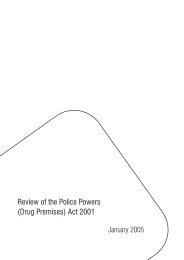Crimes (Forensic Procedures) Act 2000 - NSW Ombudsman - NSW ...
Crimes (Forensic Procedures) Act 2000 - NSW Ombudsman - NSW ...
Crimes (Forensic Procedures) Act 2000 - NSW Ombudsman - NSW ...
Create successful ePaper yourself
Turn your PDF publications into a flip-book with our unique Google optimized e-Paper software.
• <strong>NSW</strong> Police reiterated its reasons for not implementing Recommendation 14 when responding to<br />
Recommendation 15. As an alternative to amending SOPs for <strong>NSW</strong> Police, DCS and DJJ, <strong>NSW</strong> Police propose<br />
an alternative solution, that it is more appropriate for serious indictable offenders to be informed at the time of<br />
sentencing that in due course they will be asked to provide a DNA sample. <strong>NSW</strong> Police state that this would<br />
provide “more than adequate time to speak to [a] legal adviser or the legal advice hotline”. 1334<br />
• Recommendation 16 is linked to Recommendation 15 and <strong>NSW</strong> Police reiterated that it does not believe it is<br />
necessary to inform other agencies of policies relating to the amount of notice provided to serious indictable<br />
offenders before sampling takes place. <strong>NSW</strong> Police stated that inmates and detainees are provided with<br />
information about contacting a legal practitioner when they are “prepped”.<br />
• Recommendation 17 related to ongoing liaison between <strong>NSW</strong> Police, DCS and DJJ with interpreting and<br />
signing service providers. <strong>NSW</strong> Police did not consider this to be necessary and argued that the subsequent<br />
change to the <strong>Act</strong> to allow for telephone interpreters has addressed many of the problems identified in our Part<br />
7 report.<br />
• Recommendation 26 was not supported by <strong>NSW</strong> Police and related to the identification of incapable inmates.<br />
<strong>NSW</strong> Police advised that there are no hard facts to support the proposition that Inmate Testing Teams are not<br />
identifying all incapable inmates. In light of this, <strong>NSW</strong> Police does not consider it is necessary to consult with<br />
the Guardianship Tribunal about ways to improve identification of incapable inmates and is of the view that no<br />
changes to current procedures are warranted.<br />
• <strong>NSW</strong> Police declined to amend its SOPs as suggested in Recommendation 39 to require officers to consider<br />
alternatives to the use of force and to document their consideration of alternatives. <strong>NSW</strong> Police believes that<br />
the use of force has been extremely low and “that all force used by the Inmate Testing Teams to date has been<br />
appropriate.” 1335<br />
Department of Corrective Services<br />
Our Part 7 review included 17 recommendations relevant to the Department of Corrective Services (DCS). In June<br />
2006, we received advice from DCS about its implementation of these recommendations. 1336<br />
DCS accepted the majority of our recommendations, and had already implemented 11 of them. These relate to<br />
sampling education programs (Recommendations 6, 7 and 13), access to the legislation (Recommendation 8),<br />
ensuring information prepared by <strong>NSW</strong> Police is provided to inmates (Recommendation 10), providing information<br />
about DNA sampling to inmate development committees (Recommendation 12), giving inmates adequate notice prior<br />
to DNA sampling (Recommendation 15), reviewing and recording any forensic procedures requiring the use of force<br />
(Recommendations 39 to 41) and requiring DCS to identify and explain the role of each person present when a DNA<br />
sample is taken (Recommendation 43).<br />
DCS accepted a further two recommendations, and advised they are in the process of being implemented.<br />
These both relate to the finalisation of a DNA sampling agreement between <strong>NSW</strong> Police and DCS (Recommendations<br />
4 and 44).<br />
The only recommendation DCS disagreed with, Recommendation 9, was that DCS provide Correctional Centre<br />
Liaison Officers with regularly updated lists of serious indictable offences for use during the DNA sampling education<br />
program and pre test interviews. DCS argued this would be impractical, “given the size, complexity and dynamic<br />
nature of the list.” Rather, the DNA Coordinator generates lists of inmates who are serious indictable offenders, and if<br />
an inmate wishes to check whether he or she is eligible for DNA sampling, this can be determined on a case by case<br />
basis.<br />
DCS argued that the remaining three recommendations were the responsibility of <strong>NSW</strong> Police rather than DCS. These<br />
relate to the information about DNA sampling which is provided to inmates (Recommendations 11 and 16) and the<br />
provision of interpreters (Recommendation 17).<br />
Department of Juvenile Justice<br />
Our Part 7 report included 14 recommendations relevant to the Department of Juvenile Justice (DJJ). In March 2006,<br />
we received advice from DJJ detailing the current status of each of these recommendations. 1337<br />
DJJ has already implemented five recommendations – these are Recommendations 7, 11, 13, 17, and 41.<br />
Recommendation 7 required DJJ to continue to provide education programs to detainees. In response to this, DJJ<br />
included information for its staff in the ‘<strong>Procedures</strong> for Juvenile Justice Centres’ and provides training at induction and<br />
<strong>NSW</strong> <strong>Ombudsman</strong><br />
DNA sampling and other forensic procedures conducted on suspects and volunteers under the <strong>Crimes</strong> (<strong>Forensic</strong> <strong>Procedures</strong>) <strong>Act</strong> <strong>2000</strong> 291

















